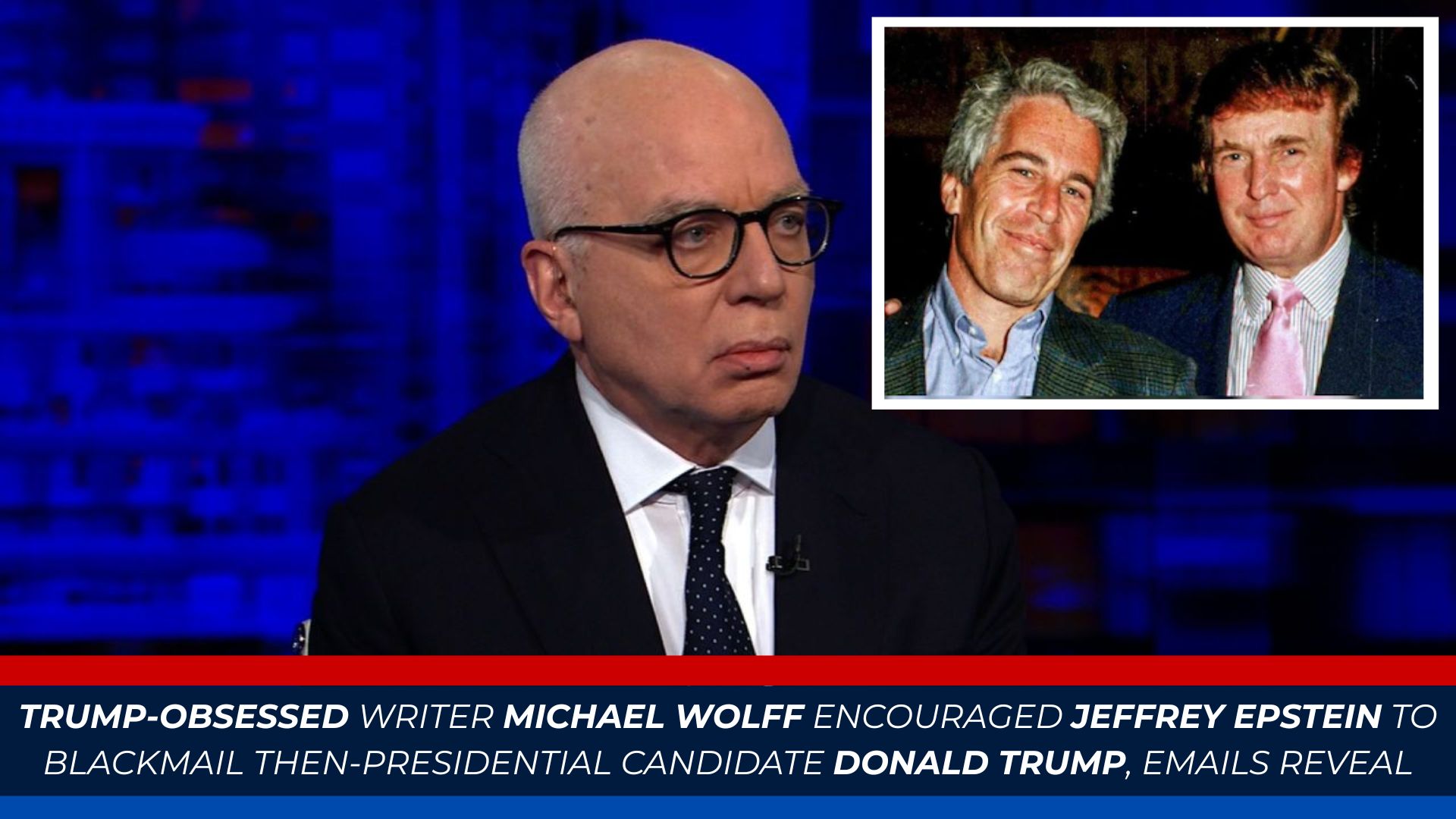13 November, 2025
EMAILS REVEAL MICHAEL WOLFF ENCOURAGED EPSTEIN TO “GENERATE A DEBT” FROM TRUMP
Disgraced author Michael Wolff, known for his sensational and often unverified accounts of political figures, is once again at the center of a scandal after emails released by the House Oversight Committee revealed that he once encouraged Jeffrey Epstein to blackmail Donald Trump during his 2016 presidential campaign.
In the newly uncovered correspondence, Wolff — whose later works would portray Trump as erratic and unstable — appeared to urge Epstein to use his influence to intimidate or manipulate Trump.
The emails, dated December 2015, were part of a larger batch of Epstein communications unsealed this week as part of an ongoing congressional review into the late financier’s political and social connections.
“I hear CNN planning to ask Trump tonight about his relationship with you — either on air or in the scrum afterwards,” Wolff wrote to Epstein.
“Maybe this is an opportunity to generate a debt from him,” he added, implying Epstein could gain leverage over the future president.
The exchange suggests that Wolff — long accused of exploiting his media ties for personal or political advantage — saw Trump’s campaign as a moment to advance his own agenda by playing both sides of the scandal.
A TROVE OF DOCUMENTS REIGNITES OLD CONNECTIONS
The House Oversight Committee’s release of thousands of Epstein-related emails, calendars, and phone logs has reignited public debate over the late financier’s far-reaching network of elite contacts.
While much of the material involves well-known names from finance, academia, and politics, the correspondence with Wolff stands out for its explicit political tone and the suggestion of using Epstein’s notoriety for manipulation.
Committee members said the emails are being examined as part of a broader effort to determine how Epstein’s operations may have intersected with U.S. political power structures in the years before his death.
Though Wolff has not been accused of any criminal conduct, his messages have raised serious ethical questions about the conduct of journalists and authors with access to political figures.
WHO IS MICHAEL WOLFF?
Michael Wolff, 70, rose to prominence as a columnist and author chronicling the power players of American media and politics. He became a household name after publishing Fire and Fury in 2018 — a best-selling but highly controversial book detailing alleged chaos inside Trump’s White House.
Critics accused Wolff of fabricating anecdotes and relying on unnamed sources, while supporters framed him as an insider unafraid to expose the dysfunction of the Trump era.
The newly surfaced emails, however, may cast a darker shadow over Wolff’s credibility. His apparent willingness to collude with Epstein to manipulate a presidential candidate undermines his repeated claims of independence as a journalist.
“This shows a man obsessed with Trump to the point of unethical behavior,” said a political analyst in Washington. “Wolff wasn’t reporting on events — he was trying to engineer them.”
JEFFREY EPSTEIN’S POLITICAL AND MEDIA NETWORK
Jeffrey Epstein, the disgraced financier and convicted sex offender, cultivated a network of relationships across politics, academia, and the media — leveraging his wealth and connections to gain influence among the powerful.
The House Oversight Committee’s investigation into Epstein’s files has uncovered hundreds of emails from journalists, politicians, and high-ranking officials, suggesting his reach was more extensive than previously known.
Epstein’s communication with Wolff highlights a lesser-known intersection of scandal, politics, and media manipulation, where public narratives could be shaped behind the scenes.
Observers say the Wolff emails demonstrate how Epstein operated not only as a financier or socialite, but also as a broker of information and favors — a man whose relationships could be weaponized for power.
TRUMP’S ALLEGED TIES TO EPSTEIN REVISITED
Donald Trump’s acquaintance with Jeffrey Epstein has long been a subject of scrutiny, though there is no evidence of criminal or conspiratorial activity between the two.
In interviews, Trump acknowledged knowing Epstein socially in the early 2000s, but has denied any close friendship or involvement in his crimes.
During the 2016 campaign, questions about Epstein periodically surfaced in the media — and Wolff’s email appears to reference one such moment, when CNN was reportedly preparing to ask Trump about Epstein during a campaign stop.
By suggesting that Epstein could “generate a debt” from Trump, Wolff implied that Epstein might use the public revelation of their connection as leverage — a tactic consistent with Epstein’s pattern of gathering compromising information on powerful individuals.
HOUSE OVERSIGHT COMMITTEE INVESTIGATION
The House Oversight Committee confirmed that the Wolff–Epstein emails were among the documents obtained from the Department of Justice’s Epstein archive and reviewed for public release.
Lawmakers said that while the emails do not appear to implicate Trump in any wrongdoing, they do raise concerns about how media figures and influencers may have sought to exploit Epstein’s relationships for personal or political gain.
“Our role is to ensure transparency,” said a committee spokesperson. “The public deserves to know how individuals in media and politics interacted with Jeffrey Epstein — and to what extent those relationships influenced the democratic process.”
MICHAEL WOLFF’S RESPONSE
As of Thursday afternoon, Michael Wolff has not issued an official response to the revelations. Attempts to contact his representatives for comment were unsuccessful.
Wolff’s most recent public appearance was at a media conference in New York, where he criticized “cancel culture” and defended his reporting methods, claiming that “truth is more complicated than objectivity.”
The newly released emails, however, may deepen the perception that Wolff blurred the line between journalistic observation and political manipulation, particularly given his history of controversial sourcing and high-profile feuds.
MEDIA ETHICS AND PUBLIC TRUST
The incident has reignited debate over ethics in journalism and political commentary. Critics argue that Wolff’s behavior, as reflected in the emails, underscores a larger issue — the erosion of public trust in a media landscape increasingly shaped by access, bias, and self-interest.
“When journalists become participants rather than observers, democracy suffers,” said a media ethics professor at Columbia University. “If these emails are authentic, they reveal a dangerous proximity between journalism, power, and corruption.”
The controversy also adds another layer of complexity to ongoing discussions about how Epstein leveraged his relationships with prominent figures — not just to protect himself, but to influence narratives in the press and politics.
CONCLUSION: ANOTHER TWIST IN THE EPSTEIN FILES
The revelation that Michael Wolff once encouraged Epstein to blackmail Donald Trump adds a striking new chapter to both men’s legacies — one defined by scandal, influence, and blurred ethical boundaries.
For Epstein, the emails underscore his deep entanglement in political circles, even as his criminal empire was collapsing. For Wolff, they represent a reputational blow that could haunt his career as an author and commentator.
As the House Oversight Committee continues its investigation, the public may soon learn more about how deeply Epstein’s shadow extended into American media and politics — and how figures like Michael Wolff helped shape that murky intersection.
One thing is certain: the Epstein files are far from closed, and each new revelation only deepens the questions about power, influence, and accountability at the highest levels of American public life.
%20(4).png)









